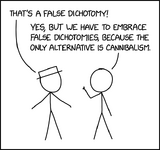I would prefer 125% of the current population living at 125% of today's standard of living, while causing 40% of todays harm to the environment.
Of course. We all would prefer living at high standards with less negative impact on the planet.
People here are implying that if they had to choose between reducing affluence in half or reducing population in half in the next century, that they would prefer reducing affluence in half instead of reducing population in half.
You refuse to tell us which you would prefer if you were faced with the two options.
But, if you say that, when faced with the two options, that the choice to reduce population is the wrong answer, then that is the same thing as stating that you prefer reducing affluence if faced with that choice.
I have yet to see anything but arguments from incredulity (and equivocations around wtf "consumption" even means here) as to why this isn't achievable.
Your failure to see doesn't mean it wasn't presented to you many times--
https://mindsetfree.blog/we-are-overloading-the-planet-now-what/.
equivocations around wtf "consumption" even means here
Again, you are jumping into a conversation I was having with another person. We were discussing the paper,
Scientists' warning on affluence.
That paper says,
A significant proportionality between consumption and impact exists for a large range of environmental, resource and social indicators. The implications of consumption on scarce energy resources emerged already in the 1970s and was confirmed by many consumption-based analyses on indicators as varied as CO2 emissions, raw materials, air pollution, biodiversity, nitrogen emissions, scarce water use or energy. Many of these studies employed multiple regression or similar techniques, yielding clear evidence for our first finding: that consumption is by far the strongest determinant of global impacts
So yes,
consumption has a meaning in environmental circles, and it is critical.
Consumption is equal to the population times the average consumption-per-capita. These authors choose to concentrate on resolving our predicament by reducing consumption-per-capita, and in the short term, this is certainly easier than trying to reduce population. But over the course of a century, reductions in population can be a much better solution, as many other papers I cite indicate.
Individual environmental issues can each be demonstrated to have been massively mitigated by (ot to be able to be mitigated by) use of technology (eg slashing fossil fuel use through replacement of coal burning by nuclear fission; development of non-ozone depleting alternatives to CFCs; recycling of steel to reduce the amount of mining needed; etc., etc.).
The paper I cited above also says:
The majority of studies agree that by far the major drivers of global impacts are technological change and per-capita consumption. Whilst the former acts as a more or less strong retardant, the latter is a strong accelerator of global environmental impact. Remarkably, consumption (and to a lesser extent population) growth have mostly outrun any beneficial effects of changes in technology over the past few decades. These results hold for the entire world as well as for numerous individual countries
So yes, these scientists, and many others, are concerned about the damage that consumption has on the planet. And yes, they acknowledge that technological changes can and does help, but the benefits of technology over the last few decades have been dwarfed by the rise in consumption.



